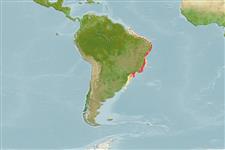Teleostei (teleosts) >
Gobiiformes (Gobies) >
Microdesmidae (Wormfishes) > Ptereleotrinae
Etymology: Ptereleotris: Greek, pteron = wing, fin + The name of a Nile fish, eleotris (Ref. 45335); randalli: Named for John E. Randall..
Environment: milieu / climate zone / depth range / distribution range
Ecology
Marine; reef-associated; depth range 8 - 70 m (Ref. 84213). Tropical
Southwest Atlantic: endemic to Brazil.
Size / Weight / Age
Maturity: Lm ? range ? - ? cm
Max length : 8.7 cm SL male/unsexed; (Ref. 84213); 4.9 cm SL (female)
Short description
Identification keys | Morphology | Morphometrics
Dorsal spines (total): 7; Dorsal soft rays (total): 22 - 24; Anal spines: 1; Anal soft rays: 21 - 23. This species is distinguished from its Atlantic congeners by having the following characters: dorsal and anal fins with bright orange-yellow submarginal bands; second dorsal and anal fins comparatively low, slightly elevated anteriorly; short caudal fin, 5ht and 6th rays prolonged as filaments; short pelvic fins, about the same length as pectorals (Ref. 84213).
Used in the aquarium trade under the name Opistognathus leitoso. The population is declining fast in some areas of the Brazilian coast (mainly off the States of Espirito Santo and Bahia) due to commercial exploration of the calcareous algae banks. This species hovers over its burrow feeding on plankton and dives headfirst in to the burrow when threatened. Found usually over sandy bottom close to reefs, but also common over sand patches as small as 10 cm in diameter, enclosed by rocky areas or in calcareous algae (Lithothamnion sp.) banks (Ref. 84213). Maximum depth from Ref. 126840.
Life cycle and mating behavior
Maturities | Reproduction | Spawnings | Egg(s) | Fecundities | Larvae
Gasparini, J.L., L.A. Rocha and S.R. Floeter, 2001. Ptereleotris randalli n. sp., a new dartfish (Gobioidei: Microdesmidae) from the Brazilian coast. aqua, J. Ichthyol. Aquat. Biol. 4(3):109-114. (Ref. 84213)
IUCN Red List Status (Ref. 130435)
Threat to humans
Harmless
Human uses
Fisheries: commercial; aquarium: commercial
Tools
Special reports
Download XML
Internet sources
Estimates based on models
Preferred temperature (Ref.
123201): 24.6 - 27.6, mean 27.2 °C (based on 58 cells).
Phylogenetic diversity index (Ref.
82804): PD
50 = 0.5000 [Uniqueness, from 0.5 = low to 2.0 = high].
Bayesian length-weight: a=0.00389 (0.00180 - 0.00842), b=3.12 (2.94 - 3.30), in cm total length, based on all LWR estimates for this body shape (Ref.
93245).
Trophic level (Ref.
69278): 3.3 ±0.4 se; based on size and trophs of closest relatives
Fishing Vulnerability (Ref.
59153): Low vulnerability (10 of 100).
